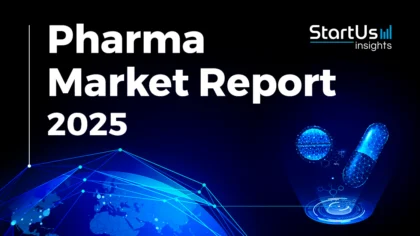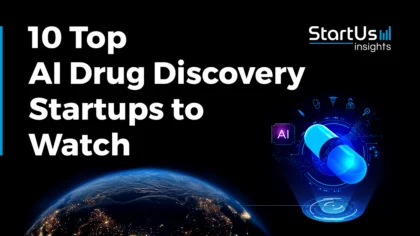In 2025, a massive transformation is taking place in the pharma industry amid a technological revolution. This shift toward digitalization and advanced tools is pushing the industry’s resilience to streamline processes, improve drug development, and deliver better patient care. These trends are reshaping every aspect of the pharmaceutical process. From AI and ML in clinical trials to advancements in gene therapy and digital therapeutics, we will explore the trends likely to continue in the coming year.
What are the Top Pharma Trends in 2025?
- Clinical Trial
- Drug Discovery
- Biopharma
- Gene Therapy
- Cell Therapy
- Precision Medicine
- Bioinformatics
- Drug Development
- Antibiotics
- Digital Therapeutics
Methodology: How We Created the Pharma Trend Report
For our trend reports, we leverage our proprietary StartUs Insights Discovery Platform, covering 5M+ global startups, 20K technologies & trends plus 150M+ patents, news articles, and market reports.
Creating a report involves approximately 40 hours of analysis. We evaluate our own startup data and complement these insights with external research, including industry reports, news articles, and market analyses. This process enables us to identify the most impactful and innovative trends in the pharma industry.
For each trend, we select two exemplary startups that meet the following criteria:
- Relevance: Their product, technology, or solution aligns with the trend.
- Founding Year: Established between 2020 and 2025.
- Company Size: A maximum of 200 employees.
- Location: Specific geographic considerations.
This approach ensures our reports provide reliable, actionable insights into the pharma innovation ecosystem while highlighting startups driving technological advancements in the industry.
Innovation Map outlines the Top 10 Pharma Industry Trends & 20 Promising Startups
For this in-depth research on the Top Pharma Trends & Startups, we analyzed a sample of 4600+ global startups & scaleups. The Pharma Innovation Map created from this data-driven research helps you improve strategic decision-making by giving you a comprehensive overview of the pharma industry trends & startups that impact your company.

Tree Map reveals the Impact of the Top Pharmaceutical Industry Trends
Based on the Pharma Industry Innovation Map, the Tree Map below illustrates the impact of the Top Pharma Industry Trends. Key trends include clinical trials, drug discovery, gene and cell therapies, and precision medicine. Rising R&D costs and supply chain disruptions necessitate innovative strategies. Bioinformatics, antibiotics, and digital therapeutics are also significant trends.

Global Startup Heat Map covers 4664 Pharma Startups & Scaleups
The Global Startup Heat Map showcases the distribution of 4600+ exemplary startups and scaleups analyzed using the StartUs Insights Discovery Platform. It highlights high startup activity in the USA and Western Europe, followed by India. From these, 20 promising startups are featured below, selected based on factors like founding year, location, and funding.

Top 10 Current Trends in Pharmaceutical Industry (2025)
1. Clinical Trials
Decentralized trials, real-world data (RWD), and AI-driven platforms improve patient recruitment and retention. Blockchain ensures data integrity and privacy in decentralized trials, while remote patient monitoring (RPM) and RWD from electronic health records (EHRs) expand participant pools and enhance trial accuracy.
AI platforms, using natural language processing (NLP) and predictive analytics, automate data analysis, streamlining drug candidate identification and promoting efficient, patient-centric, and transparent trials.
Further, the global clinical trials market is projected to grow at a CAGR of 6.49% from 2024 to 2030.
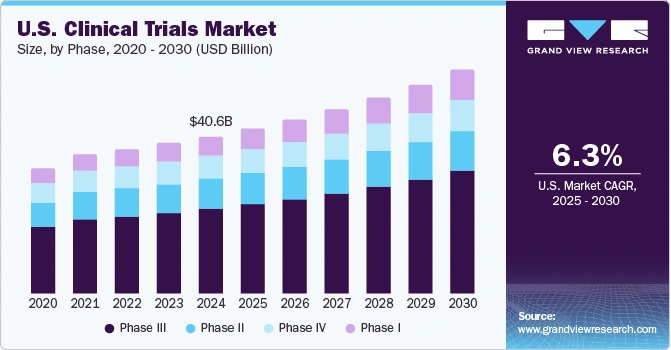
Credit: Grand View Research
BEKhealth simplifies Patient-Matching for Clinical Trials
US-based startup BEKhealth develops an AI-powered patient-matching platform to improve clinical trial recruitment. It uses NLP and deep learning to analyze both structured and unstructured data from electronic medical records (EMRs).
The platform then converts disorganized clinical notes into a synthesized, longitudinal patient graph for precise identification of protocol-eligible candidates. It also features a query and cohort builder that turns unstructured data into queryable formats. Further, the platform provides real-time patient data and automates feasibility analysis to make informed decisions quickly.
Moreover, BEKHealth secures USD 4 million to expand its AI-powered clinical research software platform.
PhaseV Trials facilitate Adaptive Trial Designs
US-based PhaseV Trials employ machine learning and statistical methods for adaptive trial design and execution. The startup utilizes reinforcement learning and casual ML to integrate clinical knowledge with advanced statistical techniques to optimize trial parameters in real time.
The multi-arm bandit approach supports exploration-exploitation strategies for treatment options based on ongoing results. The platform detects hidden signals in clinical data through casual inference for retrospective analysis. PhaseV Trials maximize resources and time efficiency to improve clinical trial efficiency and patient outcomes.
2. Drug Discovery
The global drug discovery market was valued at USD 24.84 billion in 2024. It is projected to grow from USD 28.98 billion in 2025 to USD 62.10 billion by 2033, with a CAGR of 14.90% during the forecast period (2025-2033).
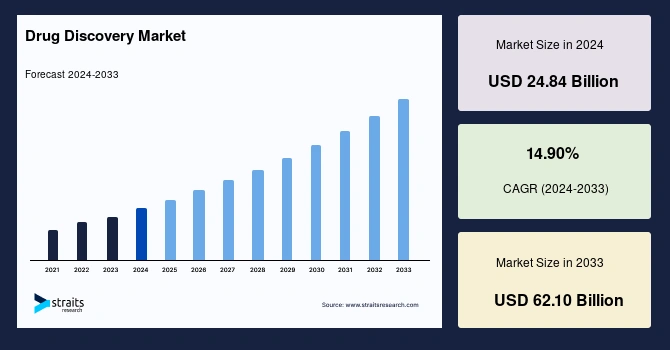
Credit: Straits Research
Advances in drug discovery focus on enhancing molecular structures, reducing toxicity, and improving pharmacokinetics. AI accelerates drug target identification and interaction prediction, while Cryo-EM offers high-resolution imaging to design targeted drugs.
NGS aids in genomic analysis for disease-associated genetic variations, and HTS tests numerous compounds simultaneously, as seen in antibiotic screening. Quantum computing supports complex molecular simulations, mitigating challenges like long production times and high costs, and boosting drug discovery efficiency in the pharmaceutical industry.
MOLECULE AI offers De Novo Molecular Design
Polish startup Molecule AI develops Molecule GEN, an AI-based drug discovery platform. The platform integrates AI algorithms with deep pharma expertise to analyze vast chemical and biological datasets, identify drug candidates, predict molecular interactions, optimizes compound properties, and streamline the development pipeline.
Researchers get access to protein metadata and visualize proteins, ligands, and their interactions in a single interface. Molecule AI automates the creation of drug-like small molecules for specific targets using AI-driven de novo design.
SENTINAL4D advances Oncology Drug Efficacy Prediction
UK-based startup Sentinal4D combines AI and 3D cell biology to enable drug efficacy prediction for oncology compounds. The platform utilizes advanced AI-powered models to analyze compounds, predict treatment success, and identify the most effective drugs.
The platform predicts the safety and toxicity profiles of oncology compounds in silico and identifies potential drug-drug interactions. Additionally, the analysis of 3D cell biology provides deeper insights into drug interactions and cell morphology. Sentinal 4D offers tools to predict the efficacy and accuracy of drugs.
3. Biopharma
Advances in biopharma technologies, including biologics, gene therapy, and next-gen sequencing (NGS), drive targeted treatments for diseases like cancer and autoimmune disorders. Biologics, such as Herceptin and Humira, target specific antigens, while CRISPR-Cas9 gene therapy corrects genetic disorders through precise editing.
The global biopharmaceuticals market is projected to reach USD 474.28 billion in 2025. It is expected to be worth USD 1369 billion by 2034, with a CAGR of 12.5% from 2024 to 2034.
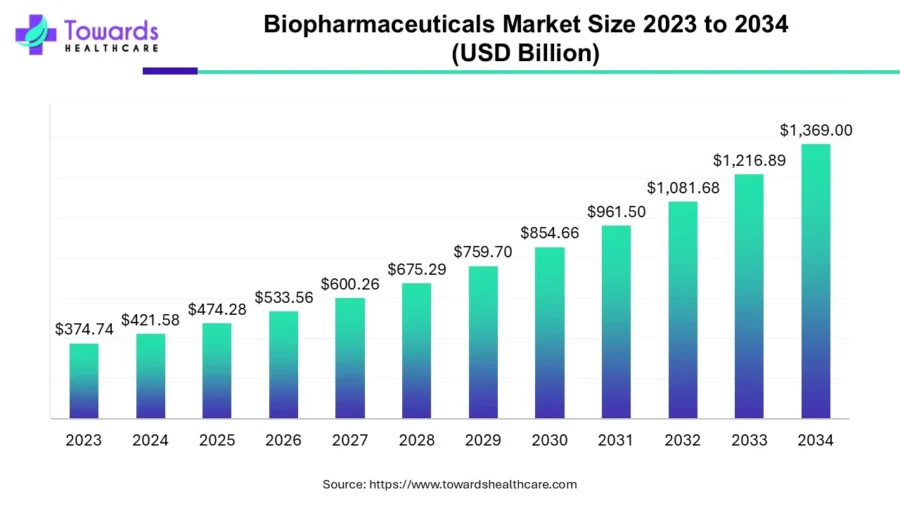
Credit: Towards Healthcare
Pharma companies also employ advanced manufacturing technologies for continuous bioprocessing, optimizing production costs and time, leading to more efficient therapeutic outcomes.
SilicoGenesis streamlines AI-based Biologics Design
SilicoGenesis provides AI-based biologics design via its cloud-based platform, Eve, enabling pharma and biotech companies to optimize therapeutic molecules. Using AI/ML techniques like graph neural networks, convolutional neural networks, and diffusion models, the platform predicts protein-protein interaction characterization, and paratope and epitope prediction.
Additionally, SilicoGenesis provides humanization services to reduce immunogenicity, aligns biologics with human germline sequences, and performs developability assessments to address aggregation, stability, and post-translational modifications, mitigating downstream risks.
Itay & Beyond, an Israel-based startup, develops a drug discovery platform that predicts drug efficacy for psychiatric disorders. The platform leverages big data analysis to gain a deep understanding of biological processes and pathologies. The technology enables testing, screening, and developing new treatments for neuro-psychiatric disorders.
It also incorporates RNA therapeutics, which offer novel, safe, and effective therapy strategies, alongside organoid technology that uses single cells to create 3D living and functioning miniature organs for testing. Combining these advanced technologies, Itay & Beyond develops tools for precision medicine in mental health.
4. Gene Therapy
The global gene therapy market is projected to grow from USD 11.08 billion in 2024 to USD 43.13 billion by 2032, with a CAGR of 18.5% during this period.
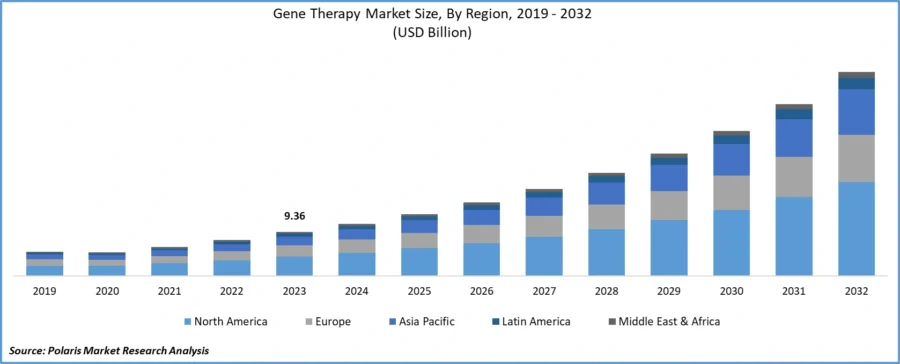
Credit: Polaris Market Research
CRISPR-Cas9, viral vectors, and next-generation sequencing (NGS) enable precise correction of complex genetic disorders. CRISPR-Cas9 targets specific DNA sequences to correct mutations, developing therapies for conditions like sickle cell anemia and cystic fibrosis.
Adeno-associated viruses (AAVs) efficiently deliver therapeutic genes, as seen in treatments for inherited retinal diseases. NGS accelerates mutation identification and gene therapy development, improving patient outcomes. These technologies drive pharmaceutical innovation, reducing time and costs in drug development while addressing previously untreatable diseases.
Beacon Therapeutics facilitates Ocular Gene Therapy
US-based Beacon Therapeutics develops ocular gene therapies for genetic eye disorders like X-linked retinitis pigmentosa (XLRP), cone-rod dystrophy (CRD), and dry age-related macular degeneration (dAMD). Using its proprietary platform, the startup identifies secreted proteins in ophthalmology.
Beacon’s late-stage XLRP candidate delivers a corrective gene via an adeno-associated viral (AAV) vector to restore photoreceptor function and slow disease progression, targeting the genetic causes of retinal diseases.
Nanocell Therapeutics develops Non-viral DNA-based In Vivo Gene Therapy
NanoCell Therapeutics develops non-viral, DNA-based gene therapies targeting cancer and autoimmune diseases. Its platform integrates DNA/RNA-transposase technologies with advanced lipid nanoparticles (t-LNPs) to optimize gene integration.
These nanoparticles co-load DNA and RNA, targeting specific cells. Nanocell’s technology also includes binder technology and minicircle DNA for T-cell activation, offering treatment for various conditions while preserving T-cell proliferation for long-term disease protection.
5. Cell Therapy
Cell therapy enhances cancer and autoimmune treatments, including CAR-T cell engineering and advanced manufacturing. CAR-T therapy modifies T-cells to target drug-resistant cancers like acute lymphoblastic leukemia.
Advances in automated bioreactor systems and real-time analytics streamline cell therapy production, improving scalability and reducing costs. These technologies boost the efficacy and accessibility of treatments, expanding options for conditions with limited therapies.
As the pharmaceutical industry adopts these innovations, it moves toward delivering curative treatments and transforming disease management.
Moreover, The global cell therapy media market is projected to grow from USD 1.3 billion in 2024 to USD 1.6 billion in 2025 and USD 4.5 billion by 2035, with a CAGR of 11.1% during the forecast period.
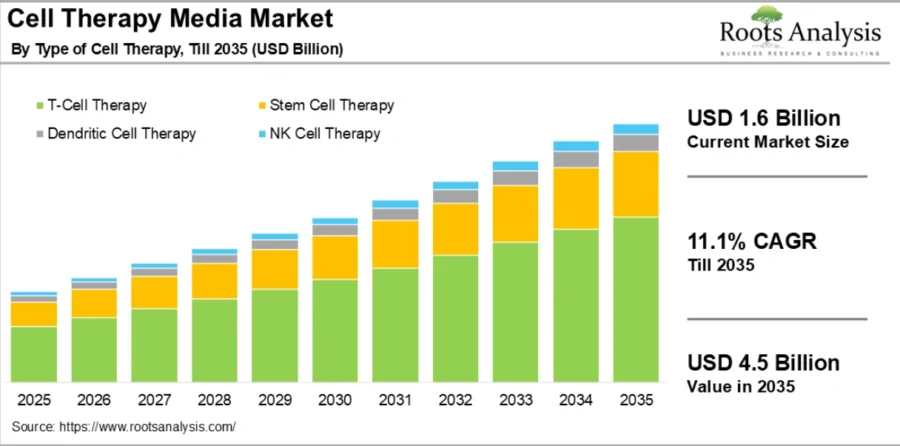
Credit: Root Analysis
Cellistic design an iPSC-based Cell Therapy Platform
Belgian Cellistic develops an allogeneic and iPSC-based cell therapy platform using its Pulse and Echo platforms. The Pulse platform employs STAR-CRISPR gene editing to create master cell banks (MCBs), testing multiple clones post cryopreservation.
The Echo™ platform leverages pre-built differentiation and expansion protocols to tackle the variability of immunotherapy. Cellistic establishes novel iPSC-based manufacturing technologies that scale cell therapies to meet growing clinical demands.
Cellares provides a cGMP Cell Therapy Manufacturing Platform
Cellares, a US-based startup offers Integrated Development and Manufacturing Organization (IDMO) that follows Industry 4.0 to mass manufacture life-saving cell therapies through the cGMP cell therapy QC platform. It develops end-to-end automated, high-throughput manufacturing solutions utilizing the Cell Shuttle platform.
Cellares offers an integrated software suite to support the majority of cell therapy modalities. By deploying Cell Shuttles in smart factories worldwide, the company meets global patient demand for cell therapies. Cellares make life-saving therapies more accessible on a global scale.

6. Precision Medicine
The global precision diagnostics and medicine market is projected to grow at a CAGR of 11.1%, reaching USD 246.66 billion by 2029.
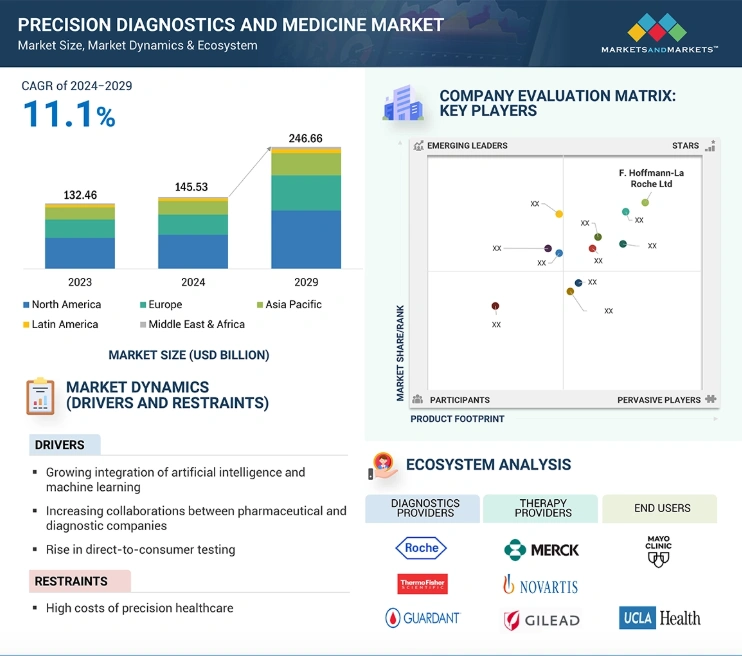
Credit: Markets and Markets
Precision medicine uses biomarker analysis to predict patient responses to therapies, enabling drugs tailored to individual genetic profiles, as seen in certain breast cancer treatments. Genomic sequencing reveals genetic variations affecting disease progression and drug response, creating personalized treatment plans.
AI-driven analytics integrate vast clinical data to identify patterns for drug development and trial optimization. These technologies shift the pharmaceutical industry toward personalized care, improving treatment efficacy by addressing patient variability.
Akiram Therapeutics enables Radio-Therapeutics-based Solid Tumor Treatment
Akiram Therapeutics develops molecular radioimmunotherapy targeting solid tumors expressing the CD44v6 protein. By combining a proprietary antibody with the radioactive isotope Lutetium-177, they selectively attack cancer cells while sparing healthy tissues.
Additionally, 177Lu-AKIR001 is used for diagnostic imaging to guide personalized dosing and improve outcomes. Akiram’s approach offers a personalized treatment option for aggressive cancers, providing hope for patients with limited options.
InnoSIGN simplifies Aberrant Activities Detection in Cell Signaling Pathways
Netherland-based InnoSIGN develops a platform OncoSIGNal to detect aberrant activities underlying tumor-driving signaling pathways such as ER, AR, PI3K, MAPK, Hedgehog, Notch, and TGFβ. Utilizing OncoSIGNal quantitatively measures mRNA levels of pathways, and target genes through an RT-qPCR testing plate, and provides precise activity scores for these pathways.
This technology delivers insights into the molecular mechanisms of cancer by translating gene expression data into a quantitative characterization of cell signaling activity. OncoSIGNal is available for research use, offering PCR tests, RNA-seq data analysis, and service testing for various tumor types, enabling a deeper understanding of cancer biology.
7. Bioinformatics
Bioinformatics leverages machine learning to identify drug targets, predict interactions, and develop therapies with fewer side effects. Cloud computing enables real-time collaboration by storing vast genomic and proteomic data.
High-throughput sequencing rapidly generates genetic information, identifying biomarkers and mutations for personalized medicine, especially in oncology and rare diseases.
These advancements streamline drug discovery, improve clinical trial accuracy, and position bioinformatics as a key driver in developing precise, effective treatments.
Further, the global bioinformatics market is projected to grow at a CAGR of 13.7% from 2023 to 2030.
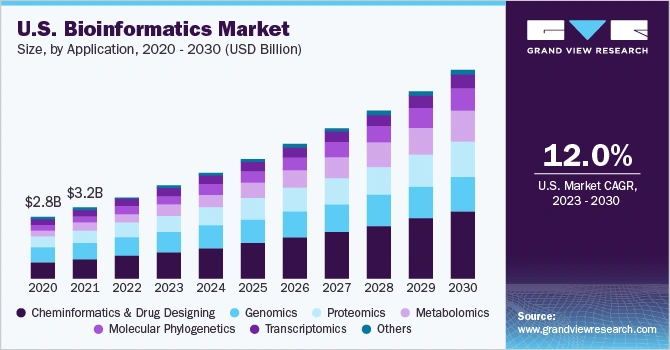
Credit: Grand View Research
Praexisio offers Next-generation Sequencing-based Personalized Drug Designing
Praexisio, a Taiwanese startup, develops personalized drug design techniques that integrate next-generation sequencing (NGS), cMAP, AI assistance, and protein molecular dynamics simulations.
The Safe Bestead technology by Praexisio interprets disease genes through AI-driven molecular docking (MD) to dock potential drug candidates onto target proteins. The platform integrates data from X-ray crystallography and MD simulations to identify alternative conformations of target proteins and evaluates drug candidates against multiple potential states. Praexisio offers effective therapeutic solutions through its comprehensive screening.
Amply Discovery provides Digital Biological Biome-based Drug Discovery
AMPLY Discovery, an Irish startup, leverages an AI-driven platform for novel drug discovery by connecting the digital biological biome with high-volume peptide, protein, and RNAi extraction technologies. It combines a proprietary in silico and in vitro hybrid platform to mine extensive biological data, identifying best-in-class molecules for drug discovery.
The platform identifies and extracts promising compounds, utilizing advanced algorithms to analyze biological data. AMPLY Discovery provides solutions that enhance the efficiency of discovering novel drugs.
8. Drug Development
Drug development now uses artificial intelligence (AI), high-throughput screening, and molecular modeling while creating new therapies. AI-driven algorithms analyze large amounts of biomedical data and identify a potential treatment for amyotrophic lateral sclerosis (ALS).
High-throughput screening allows rapid testing of thousands of compounds to find those that interact effectively. This significantly speeds up the lead optimization process.
In addition, molecular modeling allows researchers to design molecules that inhibit specific mutated proteins in melanoma. These technologies are not only efficient and accurate but also reduce time to market.
KinCon Biolabs develops Mutation-Specific Biosensors
KinCon Biolabs is an Austrian startup that develops a platform on cell-based biosensor technology for mutation-specific activity profiling to develop drugs for kinase-targeted therapies under physiologically relevant conditions. The company’s biosensor platform allows full-length biosensors to be expressed in target cell lines, facilitating the measurement of protein activity within living cells.
This technology integrates patient-specific mutations into biosensors, enabling the evaluation of mutation-specific drug efficacy and specificity. KinCon Biolans thus offers personalized medicine therapies through systematic, dose- and time-dependent drug profiling in a high-content format.
Pherion generates Drug Target & Population Insights
German startup, Pherion uses its AI-enabled platform to simulate randomized controlled trials, analyzing complex biomedical data across diverse populations. By connecting deep phenotypic data with health trajectories, the platform links disease pathology with clinical outcomes.
It profiles drug candidate safety and efficacy, focusing on targets like Lipoprotein(a). Integrating AI with human genetics, Pherion offers insights into on-target safety, adverse effects, and novel therapeutic opportunities, helping pharmaceutical developers reduce late-stage trial failures.
9. Antibiotics
The antibiotics market is estimated at USD 55.60 billion in 2025 and is projected to reach USD 67.88 billion by 2030, with a CAGR of 4.07% during this period.
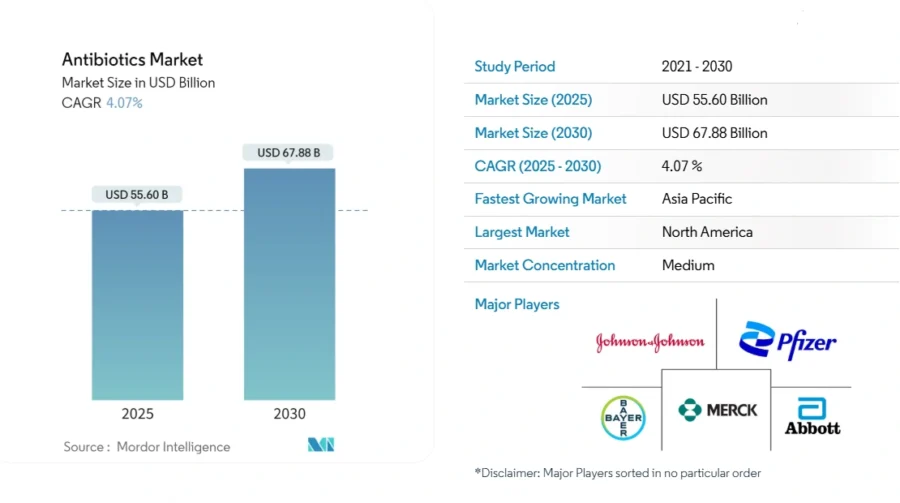
Credit: Mordor Intelligence
Genomic sequencing identifies new bacterial targets like teixobactin, which combats resistant strains by targeting lipid II in bacterial cell walls. AI accelerates antibiotic discovery, exemplified by Halicin, which disrupts multidrug-resistant bacteria.
CRISPR-Cas9 creates next-generation antibiotics by targeting resistance genes in bacteria like drug-resistant Staphylococcus aureus. Machine learning predicts bacterial evolution, aiding the design of long-lasting antibiotics.
High-throughput screening identifies potential antibiotics from large compound libraries, such as those that inhibit resistant Mycobacterium tuberculosis.
Andira Pharmaceuticals formulates a Triple Synergy Silver-based Antibiotic
Canadian startup Andira Pharmaceuticals develops Matrix3, a triple synergy antibiotic that utilizes a synergistic mechanism that amplifies silver’s antimicrobial properties by combining silver with CBC and CBG cannabinoids.
This combination targets both bacterial protective layers and intracellular components, to improve antibacterial performance. Matrix3 is integrated into the Matrix3 Shield product line, which fights against key surgical site infection-causing bacteria and multi-drug resistant strains.
MetalloBio develops Antimicrobial Agents using its Inorganic Chemistry Platform
UK-based MetalloBio develops antimicrobial agents using an inorganic chemistry platform. MetalloBio’s novel compounds exhibit activities comparable to or higher than clinically available drugs and retain this activity in multi and pan-drug resistant strains of both Gram-positive and Gram-negative bacteria with minimal emergence of resistance.
This approach treats a wide spectrum of common and complex infections, addressing a critical need in the fight against antimicrobial resistance.
10. Digital Therapeutics
DTx platforms leverage big data and AI to deliver personalized cognitive behavioral therapy to improve patient adherence and outcomes in disorder treatments.
Wearable devices used in digital diabetes management programs, continuously monitor patient vitals, providing real-time adjustments to treatment plans and reducing the reliance on medication.
The global digital therapeutics market is projected to grow from USD 8.28 billion in 2024 to USD 43.88 billion by 2032, with a CAGR of 23.2% during this period.
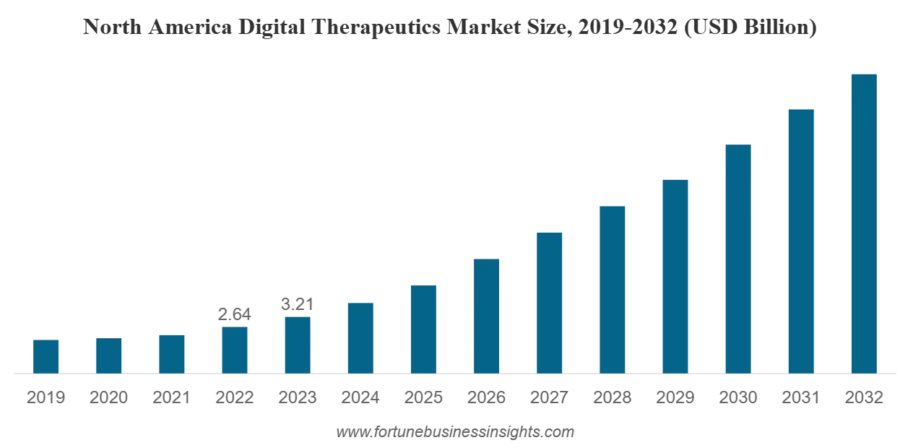
Credit: Fortune Business Insights
Additionally, Cloud computing securely stores and analyzes vast amounts of patient data, facilitating seamless integration across multiple devices and platforms.
These technologies address the challenges of patient non-compliance, high treatment costs, and demand for personalized care, offering scalable, effective alternatives to traditional therapies.
Emocog makes Mild Cognitive Impairment Treatment Devices
South Korean startup Emocog leverages advanced digital therapeutics and software such as medical device (SaMD) technologies to improve cognition in patients with mild cognitive impairment (MCI) and early-stage dementia.
Emocog develops Cogterra, a digital therapeutic device implementing software-based cognitive training regimens and diagnostic tools. Utilizing artificial intelligence (AI) and data analytics, Emocog offers non-invasive methods to address cognitive decline. Emocog empowers patients to manage their conditions effectively and advance the field of digital therapeutics in neurology.
Vitad.io builds an AI-powered Lifestyle Modification App
Vitadio, a startup from the Czech Republic, develops AI-driven digital therapeutics designed to restore cardiometabolic health by treating the root causes of type 2 diabetes, rather than just the symptoms. The app builds habits through personalized therapy, utilizing smart nudges and evidence-based content to deliver daily guidance.
This AI model provides real-time dietary feedback and recommendations, emulating the support of a human dietitian anywhere and anytime. Additionally, the platform offers access to an in-app social network and personalized guidance from registered dietitians. With a DTx platform validated by clinical studies, Vitadio treats patients’ HbA1c levels by reversing insulin resistance.
Discover all Pharma Trends, Technologies & Startups
Driven by advanced technologies and data-centric methodologies, the pharmaceutical industry in 2025 highlights the mass adoption of data integration, real-time analytics, and patient-centric therapies. Therefore, these advancements optimize the development process but also open new avenues for personalized medicine and targeted therapies.
Startups are leading this transformation, especially in areas like clinical trials, where AI-powered platforms match patients more effectively. Additionally, biometrics uncovers disease patterns and root causes. therefore, identifying these trends early is crucial for gaining a competitive edge.
The Pharma Trends & Startups outlined in this report only scratch the surface of trends that we identified during our data-driven innovation & startup scouting process. Identifying new opportunities & emerging technologies to implement into your business goes a long way in gaining a competitive advantage.



